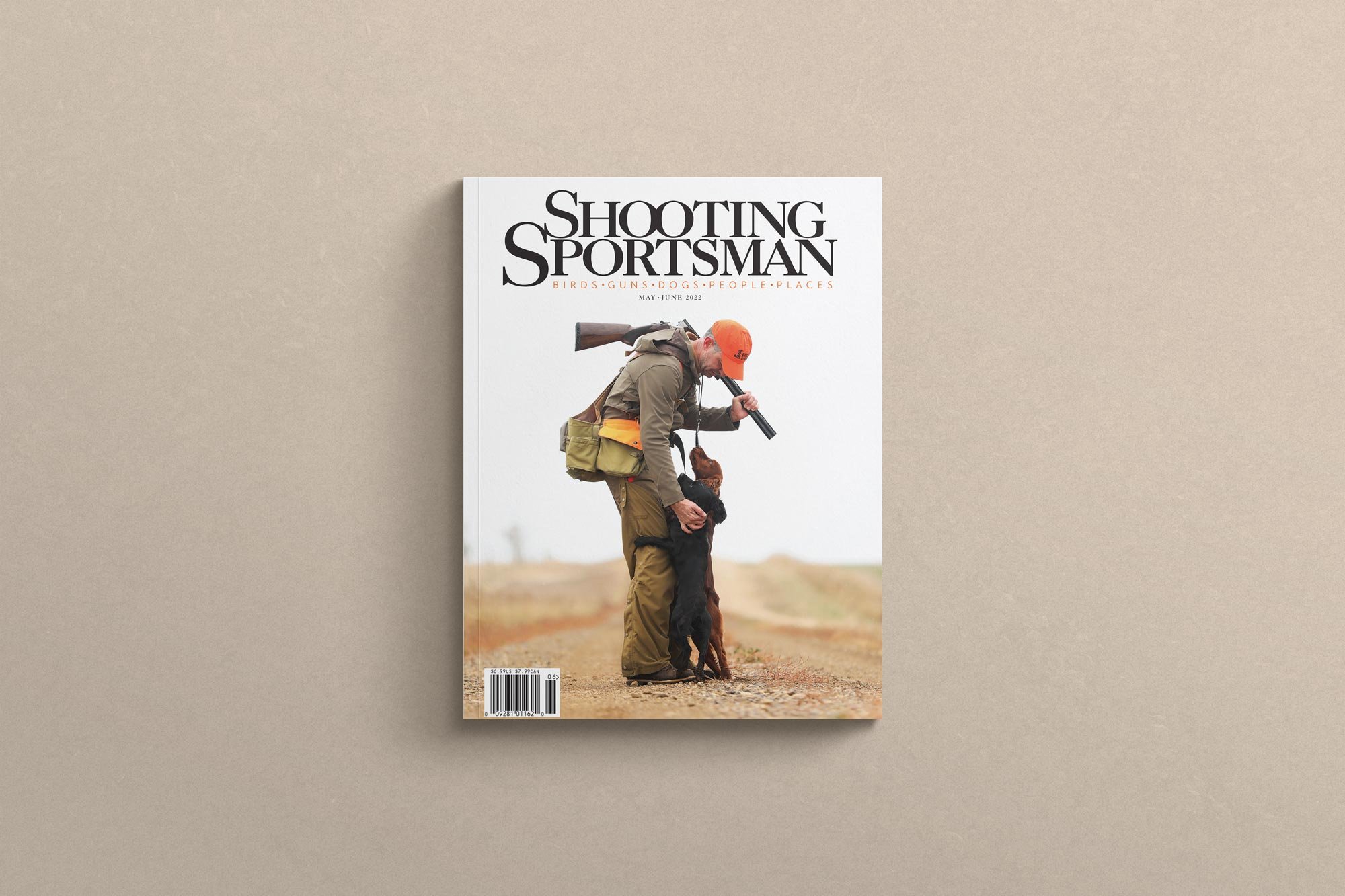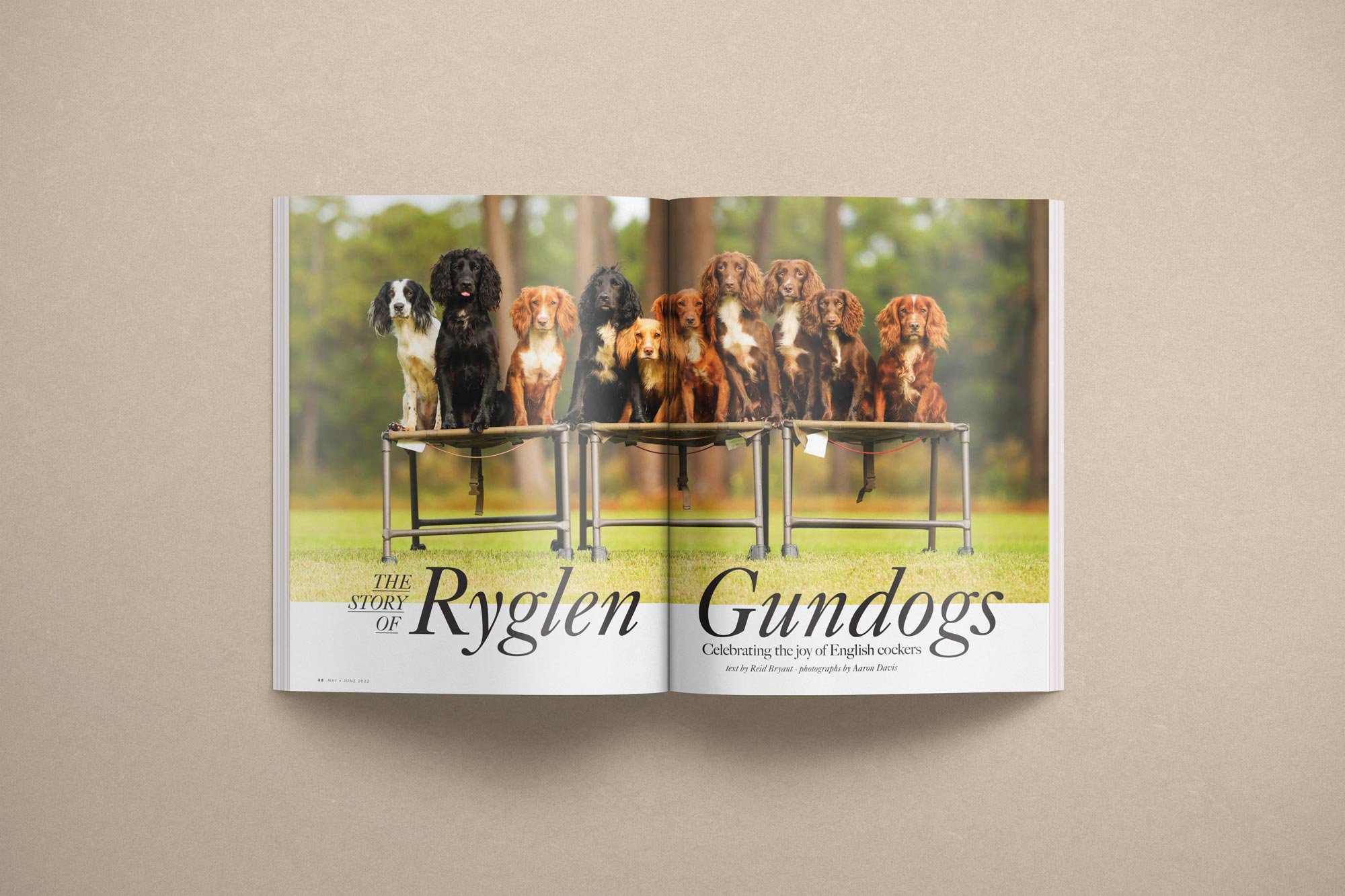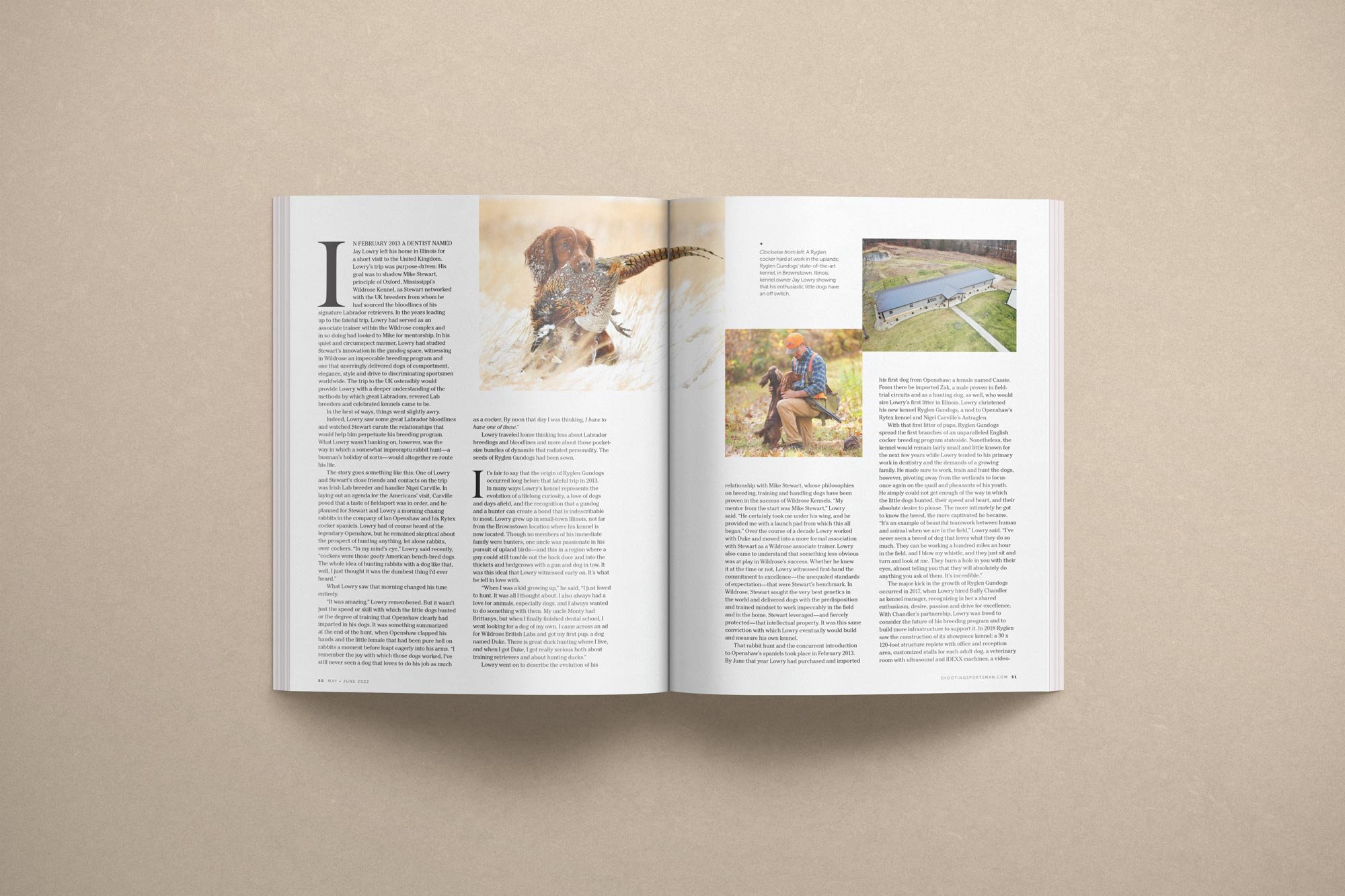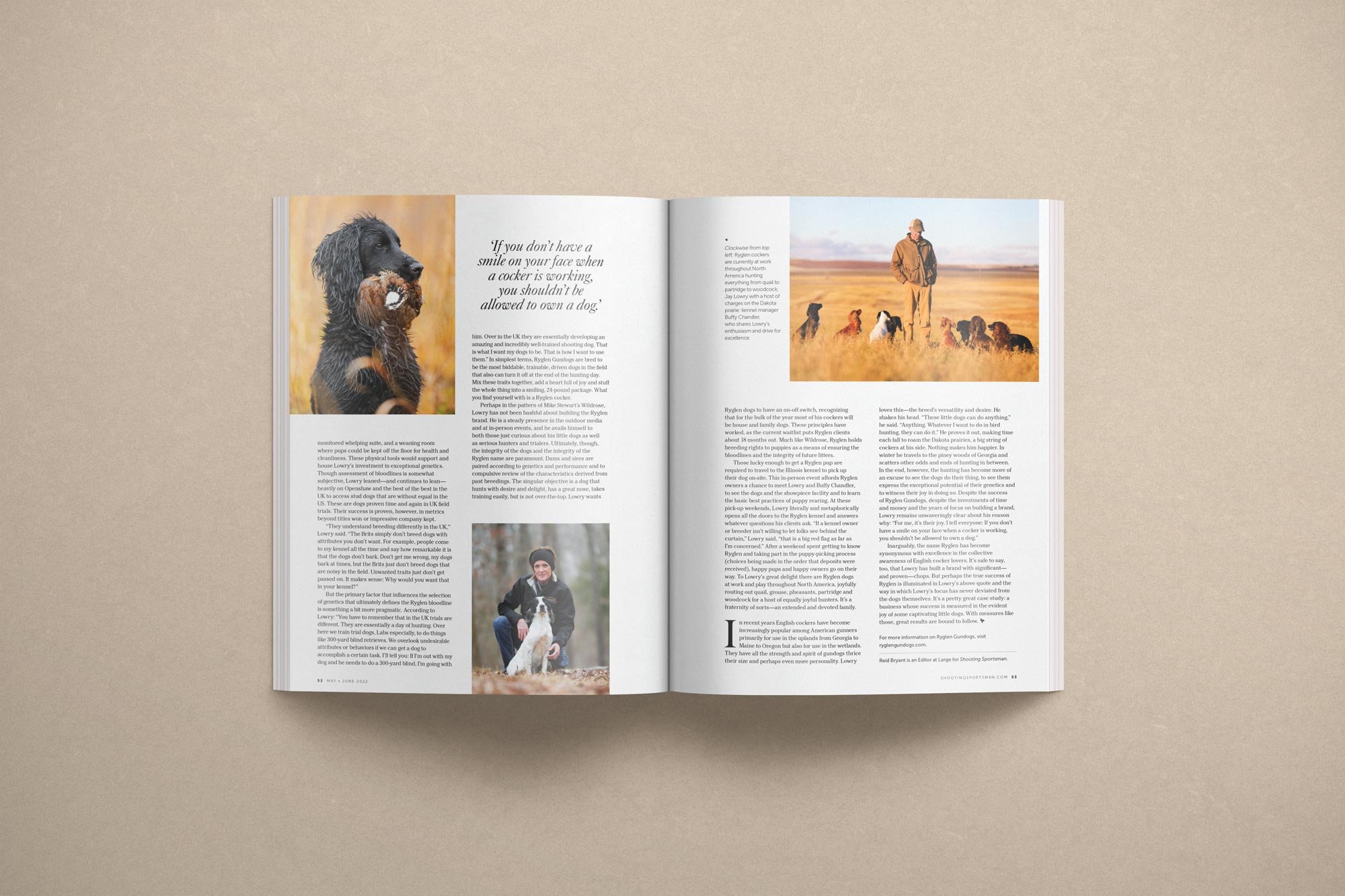The Story of Ryglen Gundogs
In February 2013 a dentist named Jay Lowry left his home in Illinois for a short visit to the United Kingdom. Lowry’s trip was purpose-driven: His goal was to shadow Mike Stewart, principle of Oxford, Mississippi’s Wildrose Kennel, as Stewart networked with the UK breeders from whom he had sourced the bloodlines of his signature Labrador retrievers. In the years leading up to the fateful trip, Lowry had served as an associate trainer within the Wildrose complex, and so doing he’d looked to Mike for mentorship. In his quiet and circumspect manner, Lowry had studied Stewart’s innovation in the gundog space, witnessing in Wildrose an impeccable breeding program and one that unerringly delivered dogs of comportment, elegance, style and drive to discriminating sportsmen worldwide. The trip to the UK ostensibly would provide Lowry with a deeper understanding of the methods by which great Labradors, revered Lab breeders and celebrated kennels came to be.
In the best of ways, things went slightly awry.
Indeed, Lowry saw some great Labrador bloodlines and watched Stewart curate the relationships that would help him perpetuate his breeding program. What Lowry wasn’t banking on, however, was the way in which a somewhat impromptu rabbit hunt—a busman’s holiday of sorts—would altogether re-route his life.
The story goes something like this: One of Lowry and Stewart’s close friends and contacts on the trip was Irish Lab breeder and handler Nigel Carville. In laying out an agenda for the Americans’ visit, Carville posed that a taste of fieldsport was in order, and he planned for Stewart and Lowry a morning chasing rabbits in the company of Ian Openshaw and his Rytex cocker spaniels. Lowry had of course heard of the legendary Openshaw, but he remained skeptical about the prospect of hunting anything, let alone rabbits, over cockers. “In my mind’s eye,” Lowry said recently, “cockers were those goofy American bench-bred dogs. The whole idea of hunting rabbits with a dog like that, well, I just thought it was the dumbest thing I’d ever heard.”
What Lowry saw that morning changed his tune entirely.
“It was amazing,” Lowry remembered. But it wasn’t just the speed or skill with which the little dogs hunted or the degree of training that Openshaw had clearly imparted in his dogs. It was something summarized at the end of the hunt, when Openshaw clapped his hands and the little female that had been pure hell on rabbits a moment before leapt eagerly into his arms. “I remember the joy with which those dogs worked. I’ve still never seen a dog that loves to do his job as much as a cocker. By noon that day I was thinking, I have to have one of these.”
Lowry traveled home thinking less about Labrador breedings and bloodlines and more about those pocket-size bundles of dynamite that radiated personality. The seeds of Ryglen Gundogs had been sown.
It’s fair to say that the origin of Ryglen Gundogs occurred long before that fateful trip in 2013. In many ways Lowry’s kennel represents the evolution of a lifelong curiosity, a love of dogs and days afield, and the recognition that a gundog and a hunter can create a bond that is indescribable to most. Lowry grew up in small-town Illinois, not far from the Brownstown location where his kennel is now located. Though no members of his immediate family were hunters, one uncle was passionate in his pursuit of upland birds—and this in a region where a guy could still tumble out the back door and into the thickets and hedgerows with a gun and dog in tow. It was this ideal that Lowry witnessed early on. It’s what he fell in love with.
“When I was a kid growing up,” he said, “I just loved to hunt. It was all I thought about. I also always had a love for animals, especially dogs, and I always wanted to do something with them. My uncle Monty had Brittanys, but when I finally finished dental school, I went looking for a dog of my own. I came across an ad for Wildrose British Labs and got my first pup, a dog named Duke. There is great duck hunting where I live, and when I got Duke, I got really serious, both about training retrievers and about hunting ducks.”
Lowry went on to describe the evolution of his relationship with Mike Stewart, whose philosophies on breeding, training and handling dogs have been proven in the success of Wildrose Kennels. “My mentor from the start was Mike Stewart,” Lowry said. “He certainly took me under his wing, and he provided me with a launch pad from which this all began.” Over the course of a decade Lowry worked with Duke and moved into a more formal association with Stewart as a Wildrose associate trainer. Lowry also came to understand that something less obvious was at play in Wildrose’s success. Whether he knew it at the time or not, Lowry witnessed first-hand the commitment to excellence—the unequaled standards of expectation—that were Stewart’s benchmark. In Wildrose, Stewart sought the very best genetics in the world and delivered dogs with the predisposition and trained mindset to work impeccably in the field and in the home. Stewart leveraged—and fiercely protected—that intellectual property. It was this same conviction with which Lowry eventually would build and measure his own kennel.
That rabbit hunt and the concurrent introduction to Openshaw’s spaniels took place in February 2013. By June that year Lowry had purchased and imported his first dog from Openshaw: a female named Cassie. From there he imported Zak, a male proven in field-trial circuits and as a hunting dog, as well, who would sire Lowry’s first litter in Illinois. Lowry christened his new kennel Ryglen Gundogs, a nod to Openshaw’s Rytex kennel and Nigel Carville’s Astraglen.
With that first litter of pups, Ryglen Gundogs spread the first branches of an unparalleled English cocker breeding program stateside. Nonetheless, the kennel would remain fairly small and little known for the next few years while Lowry tended to his primary work in dentistry and the demands of a growing family. He made sure to work, train and hunt the dogs, however, pivoting away from the wetlands to focus once again on the quail and pheasants of his youth. He simply could not get enough of the way in which the little dogs hunted, their speed and heart, and their absolute desire to please. The more intimately he got to know the breed, the more captivated he became. “It’s an example of beautiful teamwork between human and animal when we are in the field,” Lowry said. “I’ve never seen a breed of dog that loves what they do so much. They can be working a hundred miles an hour in the field, and I blow my whistle, and they just sit and turn and look at me. They burn a hole in you with their eyes, almost telling you that they will absolutely do anything you ask of them. It’s incredible.”
The major kick in the growth of Ryglen Gundogs occurred in 2017, when Lowry hired Buffy Chandler as kennel manager, recognizing in her a shared enthusiasm, desire, passion and drive for excellence. With Chandler’s partnership, Lowry was freed to consider the future of his breeding program and to build more infrastructure to support it. In 2018 Ryglen saw the construction of its showpiece kennel: a 30 x 120-foot structure replete with office and reception area, customized stalls for each adult dog, a veterinary room with ultrasound and IDEXX machines, a video-monitored whelping suite, and a weaning room where pups could be kept off the floor for health and cleanliness. These physical tools would support and house Lowry’s investment in exceptional genetics. Though assessment of bloodlines is somewhat subjective, Lowry leaned—and continues to lean—heavily on Openshaw and the best of the best in the UK to access stud dogs that are without equal in the US. These are dogs proven time and again in UK field trials. Their success is proven, however, in metrics beyond titles won or impressive company kept.
“They understand breeding differently in the UK,” Lowry said. “The Brits simply don’t breed dogs with attributes you don’t want. For example, people come to my kennel all the time and say how remarkable it is that the dogs don’t bark. Don’t get me wrong; my dogs bark at times; but the Brits just don’t breed dogs that are noisy in the field. Unwanted traits just don’t get passed on. It makes sense; why would you want that in your kennel?”
But the primary factor that influences the selection of genetics that ultimately defines the Ryglen bloodline is something a bit more pragmatic. According to Lowry: “You have to remember that in the UK trials are different. They are essentially a day of hunting. Over here we train trial dogs, Labs especially, to do things like 300-yard blind retrieves. We overlook undesirable attributes or behaviors if we can get a dog to accomplish a certain task. I’ll tell you: If I’m out with my dog and he needs to do a 300-yard blind, I’m going with him. Over in the UK they are essentially developing an amazing and incredibly well-trained shooting dog. That is what I want my dogs to be. That is how I want to use them.” In simplest terms, Ryglen Gundogs are bred to be the most biddable, trainable, driven dogs in the field that also can turn it off at the end of the hunting day. Mix these traits together, add a heart full of joy and stuff the whole thing into a smiling, 24-pound package. What you find yourself with is a Ryglen cocker.
Perhaps in the pattern of Mike Stewart’s Wildrose, Lowry has not been bashful about building the Ryglen brand. He is a steady presence in the outdoor media and at in-person events, and he avails himself to both those just curious about his little dogs as well as serious hunters and trialers. Ultimately, though, the integrity of the dogs and the integrity of the Ryglen name are paramount. Dams and sires are paired according to genetics and performance and to compulsive review of the characteristics derived from past breedings. The singular objective is a dog that hunts with desire and delight, has a great nose, takes training easily, but is not over-the-top. Lowry wants Ryglen dogs to have an on-off switch, recognizing that for the bulk of the year most of his cockers will be house and family dogs. These principles have worked, as the current waitlist puts Ryglen clients about 18 months out. Much like Wildrose, Ryglen holds breeding rights to puppies as a means of ensuring the bloodlines and the integrity of future litters.
Those lucky enough to get a Ryglen pup are required to travel to the Illinois kennel to pick up their dog on-site. This in-person event affords Ryglen owners a chance to meet Lowry and Buffy Chandler, to see the dogs and the showpiece facility and to learn the basic best practices of puppy rearing. At these pick-up weekends, Lowry literally and metaphorically opens all the doors to the Ryglen kennel and answers whatever questions his clients ask. “If a kennel owner or breeder isn’t willing to let folks see behind the curtain,” Lowry said, “that is a big red flag as far as I’m concerned.” After a weekend spent getting to know Ryglen and taking part in the puppy-picking process (choices being made in the order that deposits were received), happy pups and happy owners go on their way. To Lowry’s great delight there are Ryglen dogs at work and play throughout North America, joyfully routing out quail, grouse, pheasants, partridge and woodcock for a host of equally joyful hunters. It’s a fraternity of sorts—an extended and devoted family.
In recent years English cockers have become increasingly popular among American gunners primarily for use in the uplands from Georgia to Maine to Oregon but also for use in the wetlands. They have all the strength and spirit of gundogs thrice their size and perhaps even more personality. Lowry loves this—the breed’s versatility and desire. He shakes his head. “These little dogs can do anything,” he said. “Anything. Whatever I want to do in bird hunting, they can do it.” He proves it out, making time each fall to roam the Dakota prairies, a big string of cockers at his side. Nothing makes him happier. In winter he travels to the piney woods of Georgia and scatters other odds and ends of hunting in between. In the end, however, the hunting has become more of an excuse to see the dogs do their thing, to see them express the exceptional potential of their genetics and to witness their joy in doing so. Despite the success of Ryglen Gundogs, despite the investments of time and money and the years of focus on building a brand, Lowry remains unwaveringly clear about his reason why: “For me, it’s their joy. I tell everyone: If you don’t have a smile on your face when a cocker is working, you shouldn’t be allowed to own a dog.”
Inarguably, the name Ryglen has become synonymous with excellence in the collective awareness of English cocker lovers. It’s safe to say, too, that Lowry has built a brand with significant—and proven—chops. But perhaps the true success of Ryglen is illuminated in Lowry’s above quote and the way in which Lowry’s focus has never deviated from the dogs themselves. It’s a pretty great case study: a business whose success is measured in the evident joy of some captivating little dogs. With measures like those, great results are bound to follow.
First Published in Shooting Sportsman Magazine



